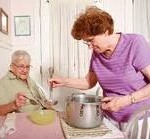 With the recent recession forcing young adults to move back in with mom and dad, and the aging baby boomer population requiring care and support from their adult children, the Generation Xers are feeling the pressure. Currently, more than 66 million Americans are in the role of caregiver – financially and emotionally – for an aging parent or parents, and their own children and spouses, according to AARP. And the average care giver is a woman in her mid-forties with a full time job of her own. That’s a lot of support falling on one person’s shoulders.
With the recent recession forcing young adults to move back in with mom and dad, and the aging baby boomer population requiring care and support from their adult children, the Generation Xers are feeling the pressure. Currently, more than 66 million Americans are in the role of caregiver – financially and emotionally – for an aging parent or parents, and their own children and spouses, according to AARP. And the average care giver is a woman in her mid-forties with a full time job of her own. That’s a lot of support falling on one person’s shoulders.
According to a recent Kiplinger article, here are four ways for the Sandwich Generation to help their aging parents:
• Discuss long-term care insurance, but do it while your parents are still healthy enough to qualify
• Investigate adult-day care so you don’t have to quit your job
• Take advantage of tax breaks through your employer’s dependent care flex spending account
• Ask your employer about care-giving benefits
So what about the grown kids who’ve moved back in after getting laid off, or unable to find a job after college graduation? Well, Kiplinger’s also has some advice for helping your kids as well:
• If you can spare the cash, give them a one-time lump sum gift that encourages them to budget wisely.
• If you can’t afford the lump sum outlay, help them pay essential bills like health and auto insurance.
• Set ground rules before they move in with a length of stay and rent expectations.
• Consolidate mobile phone plans, add them to your car insurance, or health coverage to lover premiums, and possibly save both of you money.
The Sandwich Generation can be a stressful, pressure-filled place to be, especially when you’re the one in the middle. But surprisingly, according to a recent Pew Research Center study, adults in the sandwich generation are just as happy with their lives overall as are other adults. Some 31% say they are very happy with their lives, and an additional 52% say they are pretty happy. Happiness rates are nearly the same among adults who are not part of the sandwich generation: 28% are very happy, and 51% are pretty happy. So don’t lose sight of yourself and don’t forget to care for yourself.
Your Next Move can help you locate the perfect senior housing for your aging loved one. Our team of relocation specialists are also with you through every step of the transition process including home sale, estate sales and moving household goods.
This blog post is brought to you by the team at Your Next Move. If you are interested in further information you may contact us below. LIKE us on Facebook and follow us on Twitter to get the most current communication on the subject of senior relocation. Please join our mailing list.
Your Next Move, Easing Your Senior Transition
Julie Kopetsky, President
www.yournextmovenc.com
919-601-8203
Julie.kopetsky@yournextmovenc.com




